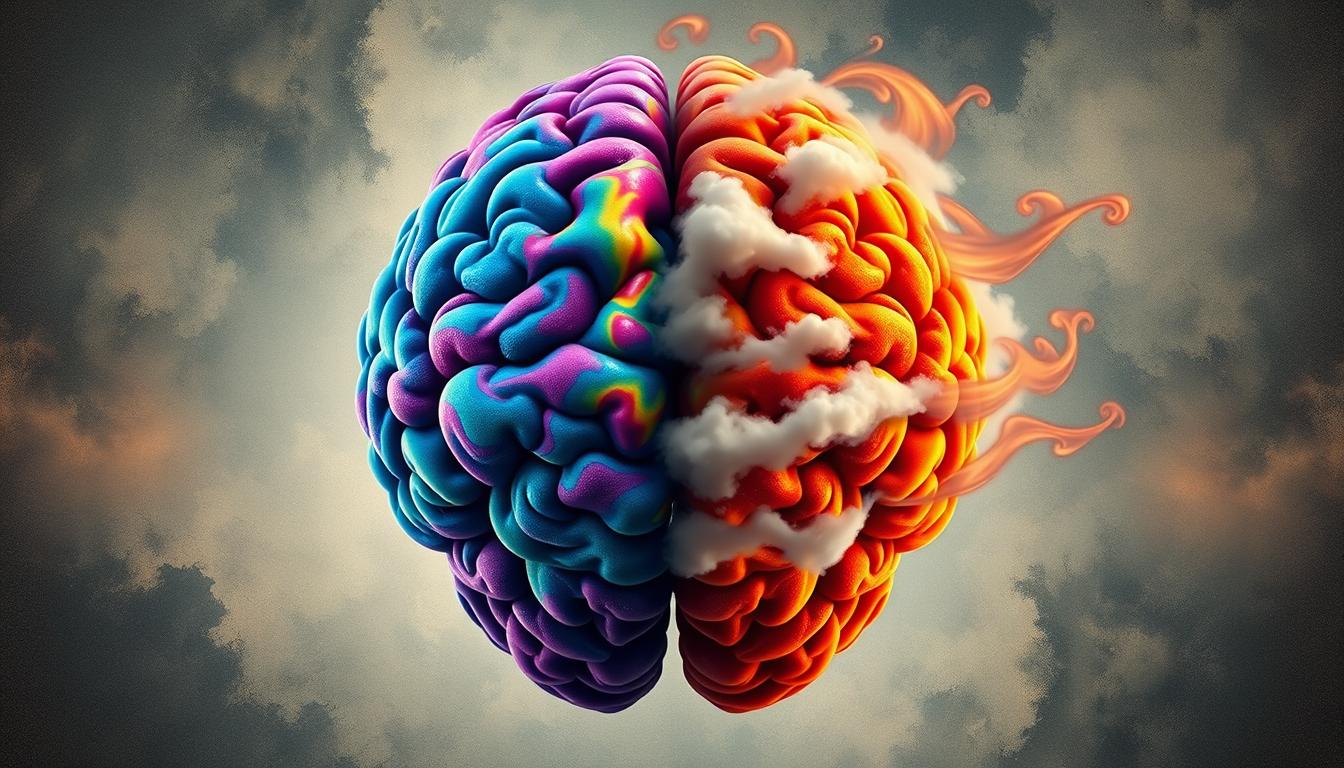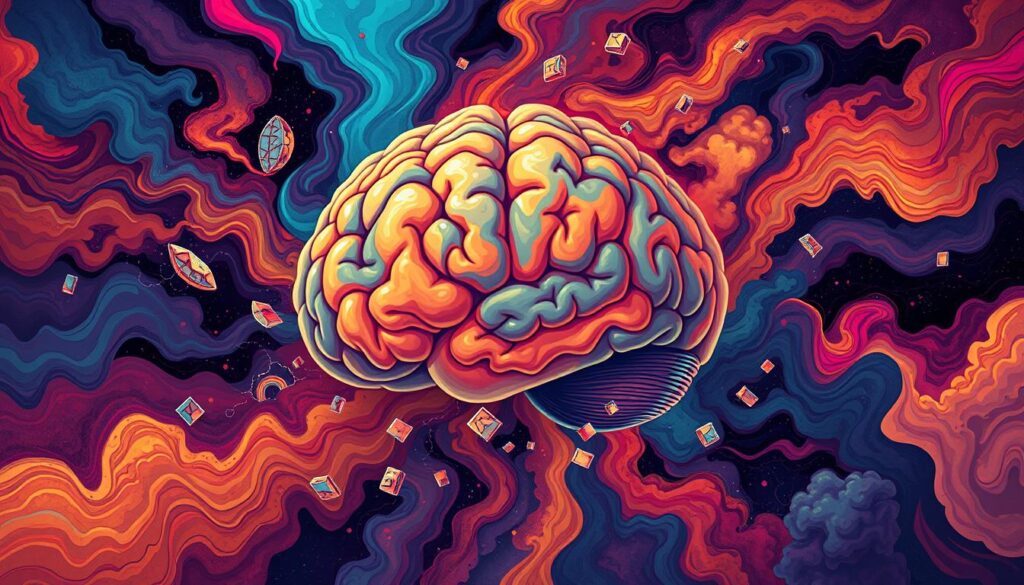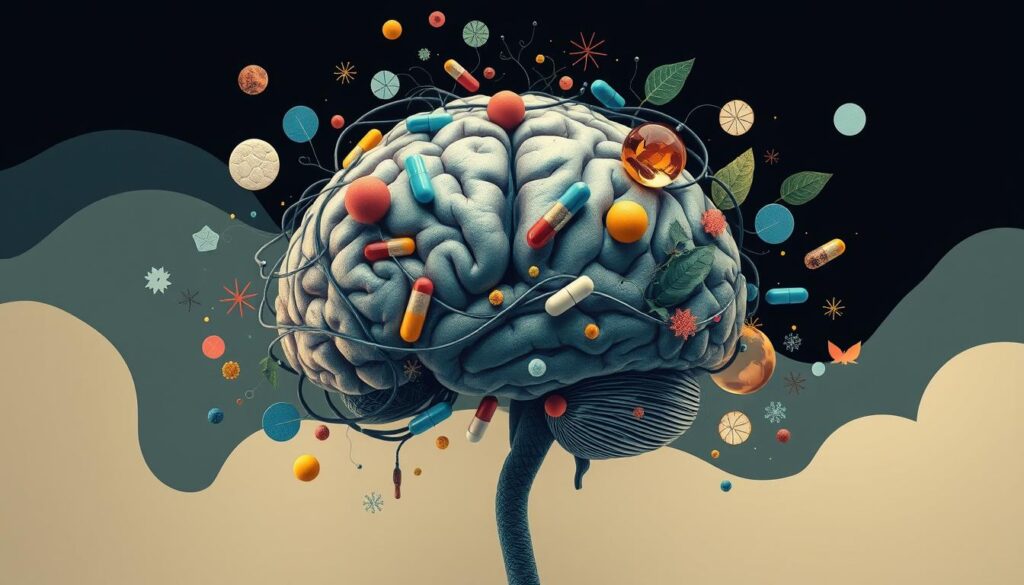Can Migraines Cause Memory Loss? This Might Surprise You

Migraines are more than just headaches. They might also affect your memory and thinking skills.
Recent studies are looking into how these episodes impact your brain. Many think migraines only cause pain, but they might also make you feel less sharp mentally.
This article explores how migraines can affect your memory and thinking.
We look at research and how migraines might lead to cognitive decline.
Our goal is to highlight the often-overlooked effects of migraines on your brain.
Table of Contents
- Understanding Migraines and Their Impact on Health
- Complex Relationship Between Migraine and Cognitive Function
- Subjective Cognitive Decline in Migraine Patients
- Can Migraines Actually Cause Memory Loss?
- The Link Between Migraines and Dementia Risk
- Treatment of Migraines and Its Effect on Cognition
- Interventions to Mitigate Cognitive Decline in Migraine Sufferers
- Conclusion
Understanding Migraines and Their Impact on Health
Migraines are a big problem worldwide, seen as a serious neurological disorder.
They affect about 20.2% of women and 9.4% of men at some point. There are two main types: episodic and chronic migraines.
Discover Your Path to a Longer, Healthier Life!
Take our free quiz to see how your lifestyle measures up to the world's longest-living communities and receive expert tips for a healthier, longer life.
Take the QuizThis shows how important it is to understand their health effects.
Prevalence of Migraines in the Population
Many people with migraines face brain challenges. About 65.3% of patients show brain function problems in tests.
But, studies in communities show different results. They suggest migraines might not always affect brain function. This shows how important it is to look at each situation.
Looking into migraines helps us see their big impact on society.
Knowing how common migraines are helps doctors create better treatments. This can improve life for those who suffer from migraines.
Complex Relationship Between Migraine and Cognitive Function
The link between migraine and brain function is complex and has been studied a lot.
About 40% of people with migraine say they have trouble with thinking, memory, and focus. This shows how migraines can affect both how we feel and our brain’s performance.
Studies show that nearly two-thirds of those with chronic migraine have memory issues.
This is much higher than those with episodic migraine. Chronic migraine is when you have headaches over 15 days a month for more than three months.
This highlights the need to understand how migraines affect our brains differently.
About 60% of people with chronic migraine struggle with memory, compared to those with episodic migraine. Researchers are working to understand how different types of migraines affect memory.
Even though migraines might make us more likely to have cognitive problems later, there’s no clear link to dementia.
A study with nearly 12,500 Americans found no dementia risk from migraines in people aged 51 to 70 over 20 years.
Still, people with migraines might be 50% more likely to have cognitive decline than those without. Since migraines are more common in women, it’s crucial to understand this complex relationship for better treatment and management.
| Cognitive Impact | Chronic Migraine | Episodic Migraine |
|---|---|---|
| Memory Problems Prevalence | ~60% | ~15% |
| Attention Decline | Common | Less frequent |
| Processing Speed Decline | Notable | Often stable |
| Risk of Cognitive Decline | 50% higher | Normal |
Subjective Cognitive Decline in Migraine Patients
Migraine patients often feel like their thinking skills are getting worse.
They might notice memory problems and other thinking issues that don’t show up in tests. Even though studies have mixed results, many people feel their minds are really affected by migraines.
Symptoms can pop up at any time during a migraine.
This includes feeling like you can’t focus or make decisions.
These problems are especially tough for people with migraines. They can feel almost as bad as the pain itself.
Studies show that mental health matters a lot for how migraines affect thinking.
Feeling sad or anxious can make people think they’re not thinking as well as they should. Also, not sleeping well can make these feelings worse.
Looking at different studies, we see mixed results.
Some studies say migraines can hurt thinking skills, but others don’t find a big difference.
Some research even suggests that older people with migraines might do better on thinking tests than others.
People with chronic migraines often feel like their thinking is getting worse, even when the headache is mild.
This makes them worry about their thinking skills. It also makes their life harder and can lead to more disability.
Can Migraines Actually Cause Memory Loss?
Studies have shown mixed results about how migraines affect memory. Some say migraines can lead to memory loss, while others disagree.
People with migraines are more likely to have brain changes.
The CAMERA II study found that migraines might make brain lesions worse. This could affect how well we think.
Women get migraines more often than men.
This has led to more research on how migraines affect the brain. Some studies found no big difference in brain function between those with migraines and those without.
But, other studies have shown mixed results.
A small study found that migraines didn’t affect brain function much. Yet, it didn’t look at long-term effects.
It’s possible that migraines aren’t the only thing that affects brain function.
More research is needed to understand how migraines impact memory and brain health.
| Study | Participants | Findings |
|---|---|---|
| CAMERA II | Not specified | Migraines contribute to progression of white matter lesions |
| Small study | 61 migraine patients, 50 non-migraine headache patients, 367 headache-free individuals | No significant differences in cognitive functioning |
| Danish Twin Registry | 536 migraineurs, 857 non-migraineurs | No differences in cognitive scores |
| Mixed Studies | Various | Different impacts on cognitive function reported |
General Cognitive Function and Language Skills
Studies show that migraines can hurt thinking abilities.
People with migraines struggle more with language than others. This can make it hard to communicate and interact daily.
Attention, Executive Functions, and Memory
Migraine patients also have trouble with attention, planning, and memory.
They tend to do worse on tasks that need these skills.
This makes it hard to remember things and handle tasks that require planning.
| Cognitive Area | SMD Values | Comparison with Control Group |
|---|---|---|
| General Cognitive Function | -0.44 | Lower scores in migraine patients |
| Language Skills | -0.37 | Significant deficits observed |
| Attention | -0.50 | Marked impairment noted |
| Executive Functions | -0.42 | Clear challenges reported |
| Memory | -0.48 | Reduction in performance |
Many studies from around the world agree: migraines can hurt the brain.
This is a big worry for those with migraines. It shows how important it is to help them with these brain problems.
The Link Between Migraines and Dementia Risk
Recent studies show a strong link between migraines and a higher risk of dementia.
This is especially true for those who have migraines often. To understand this connection, we need to look at different types of dementia and their symptoms.
Lifespan Comparison Tool
Compare the life expectancy by the U.S. State
We also need to explore the specific risk factors for people with migraines.
Understanding Dementia: Types and Symptoms
Dementia is a group of cognitive disorders, with Alzheimer’s being the most common in older adults. Symptoms can vary but often include:
- Memory loss
- Difficulty in communication
- Decline in problem-solving capabilities
- Disorientation and confusion
As dementia gets worse, people may struggle with everyday tasks and even recognize family members.
This makes early detection and treatment very important.
Increased Risk Factors for Migraineurs
There are certain factors that increase the risk of dementia in people with migraines. These include:
- Age: Younger people under 65 with migraines are at a higher risk for Alzheimer’s than older adults.
- Migraine Frequency: Those with chronic migraines are more likely to develop Alzheimer’s, at a rate of 8.0 per 1,000 person-years. This is compared to 4.1 for those without migraines.
- Comorbidities: Migraine patients often have higher rates of hypertension, diabetes, and other heart conditions. This makes their health situation more complicated.
- Body Mass Index: A higher BMI, especially in those with migraines, increases the risk of Alzheimer’s. This shows how important overall health is.
These factors show how complex managing migraines can be.
They highlight the need for careful attention to cognitive health in migraine patients.
| Factor | Risk Level | Notes |
|---|---|---|
| Age | Increased risk for | Younger migraine sufferers may face higher dementia risk. |
| Migraine Type | Chronic > Episodic | Chronic migraines linked to Alzheimer’s more than episodic. |
| Comorbidities | Higher prevalence | Patients often have hypertension and diabetes. |
| BMI | Higher BMI = Increased risk | Body weight management is crucial for mitigating risks. |
Treatment of Migraines and Its Effect on Cognition
Migraine treatment includes many medicines to help with the pain.
These drugs can help with headaches but might also affect how we think. It’s important for both patients and doctors to know how these treatments work on our minds.
Pharmacological Approaches and Their Impact
There are many types of medicines for migraines, each with its own effect on thinking. Some common ones are:
- Nonsteroidal anti-inflammatory drugs (NSAIDs)
- Triptans
- Antiseizure medications
- Tricyclic antidepressants
- Narcotic painkillers
- Beta-blockers
These medicines aim to lessen migraine pain and how often it happens.
But, some might make thinking harder, especially if used for a long time.
For example, Topiramate, used to prevent migraines, can cause memory problems. Some antidepressants and anti-seizure drugs might also make it harder to think clearly.
Brain fog is a common symptom of migraines. It can make it hard to focus, remember things, and do simple tasks. Finding the right treatment can help improve these problems.
But, not just migraine medicines can affect our thinking.
Even common drugs like benzodiazepines for anxiety can mess with memory, especially in older people.
Some over-the-counter sleep aids and statins for cholesterol can also harm memory and thinking.
Studies show that migraines can slow down how we process information and affect our ability to make decisions.
But, they don’t seem to cause long-term thinking problems like dementia.
Doctors might choose treatments carefully to help manage migraines without harming thinking skills, especially for older adults.
Interventions to Mitigate Cognitive Decline in Migraine Sufferers
For those with migraines, addressing cognitive decline is key.
It involves using various methods to boost cognitive function and overall health.
Effective management of migraines is essential to prevent cognitive issues.
Here are some strategies to help:
- Lifestyle Adjustments: Regular exercise, a balanced diet, and enough sleep are crucial. Research shows these habits can help reduce cognitive decline in migraine sufferers.
- Cognitive Training: Techniques like memory exercises and problem-solving can improve cognitive skills. These can be through computer programs or one-on-one therapy sessions.
- Pharmacological Therapies: Medications for migraines might also help with cognitive decline. Drugs like Topiramate and Gabapentin are often used. However, it’s important to weigh their benefits against possible side effects.
- Preventative Measures: Treatments aimed at reducing migraine frequency are recommended for at least three months. Sticking to these treatments can help lessen migraine attacks and lower cognitive impairment risk.
Studies show that the right interventions are crucial for managing cognitive decline.
By effectively managing migraines, individuals can improve their cognitive health.
This leads to a better quality of life for those with migraines.
| Intervention Type | Description | Potential Benefits |
|---|---|---|
| Lifestyle Adjustments | Incorporating healthy habits like exercise, balanced nutrition, and sleep hygiene. | Improved overall health and cognitive reserve. |
| Cognitive Training | Utilizing exercises aimed at enhancing memory and cognitive skills. | Strengthened cognitive functions and reduced decline. |
| Pharmacological Therapies | Using medications to manage migraines and potentially address cognitive issues. | Reduced migraine frequency along with cognitive symptom management. |
| Preventative Measures | Long-term treatment strategies aimed at decreasing migraine occurrence. | Lower risk of cognitive decline associated with frequent migraines. |
Conclusion
In conclusion, migraines are a complex neurological disorder that extend beyond headaches, significantly affecting cognitive functions like memory and thinking skills.
Research shows that many migraine sufferers, especially those with chronic migraines, report cognitive difficulties, including memory issues and attention deficits.
While the link between migraines and cognitive decline requires further study, evidence suggests that frequent migraine sufferers face a heightened risk of cognitive impairment.
It’s essential for healthcare professionals to consider these challenges in treatment plans.
By implementing effective management strategies—such as lifestyle changes, cognitive training, and appropriate medications—patients can improve their quality of life and potentially reduce cognitive effects.
Understanding the full impact of migraines fosters greater empathy and emphasizes the need for comprehensive care that addresses both pain relief and cognitive health.

 972-393-1699
972-393-1699







